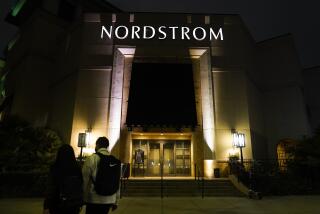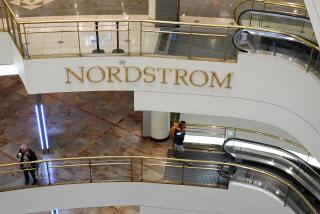Nordstrom’s First-Quarter Net Income Declines 43%
- Share via
Nordstrom reported a sharp drop in earnings for the quarter ended April 30, blaming the problem on competitive pricing and expenses that rose, in part, because of a dispute between management and labor.
But a union representing some Nordstrom employees contended that the Seattle-based specialty retailer, known for its superior customer service, is suffering from a serious erosion in consumer confidence because of its labor conflicts. Analysts were more inclined to blame inventory problems at Nordstrom during a fairly tough time in the retail industry.
Nordstrom on Thursday posted net earnings of $13.2 million for the first quarter, down nearly 43% from the $22.97 million earned a year ago. Sales rose about 8% to $555 million. Nordstrom’s stock price fell 25 cents Thursday to close at $27.75 a share in over-the-counter trading.
In February, Nordstrom reported its first annual earnings decline as a public company. The retailer’s profit fell 34% to $31.4 million while sales rose 12% to $857.5 million.
Nordstrom also said then that it was establishing a $15-million fund to settle claims from employees for back pay. The Washington State Department of Labor and Industries ruled that Nordstrom violated the state’s minimum wage act by pressuring employees to work extra hours without pay.
Nordstrom said in a news release that earnings fell partly because the company “reduced its markup on merchandise to remain price competitive.” The company said inflation contributed to the increase in expenses, adding that the labor conflict was among the factors that “made it difficult to reduce expenses.” The company did not elaborate and no official was available for comment.
Union official Joe Peterson said that the earnings decline “can be directly attributed to Nordstrom’s labor dispute and the company’s unwillingness to change its illegal employment structure.”
“There are lots of people who aren’t shopping there even though the union has never called for a consumer boycott,” said Peterson, president of the United Food & Commercial Workers Union Local 1001, which represents nearly 2,000 Nordstrom workers in the Seattle area. “It’s unfortunate that the company has had to be so preoccupied with the dispute.”
But retail analysts said Nordstrom is suffering some typical retailer woes that are made worse by problems maintaining appropriate inventory levels and by price competition.
“I don’t think they saw real direction from consumers in style preference,” said Edward A. Weller, an analyst with Montgomery Securities in San Francisco. “I’ve been kind of distressed that they’ve had an extended period of sub-par performance, but that doesn’t mean I’m going to throw the baby out.”
Nordstrom has had merchandising difficulties before, said analyst Sarah Stack at Bateman Eichler, Hill Richards in Los Angeles. “Because they don’t have elaborate merchandise reporting systems, every once in a while it gets out of line, but they’ve amazed everyone and turned it around before,” she said.
More to Read
Inside the business of entertainment
The Wide Shot brings you news, analysis and insights on everything from streaming wars to production — and what it all means for the future.
You may occasionally receive promotional content from the Los Angeles Times.










